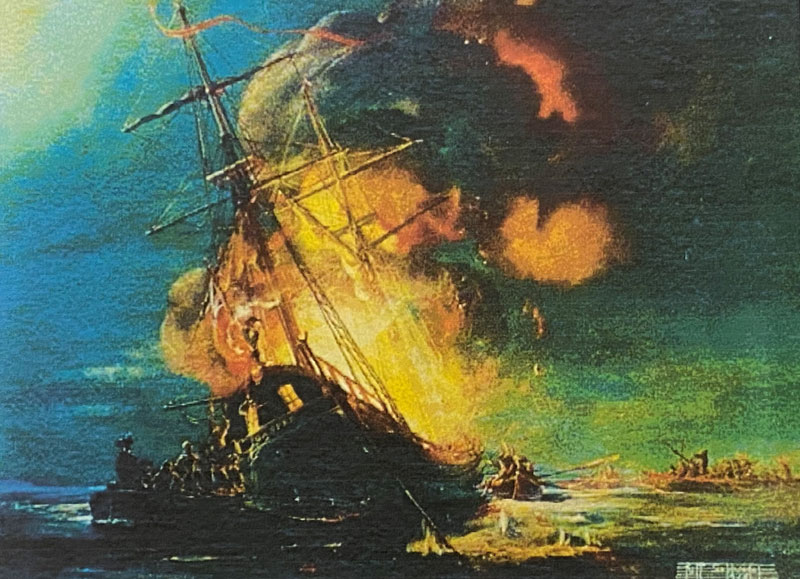
We’ve all heard the almost immortal words: “Taxation without representation is tyranny”; most of us have been taught that these were the fighting words that ignited our War of the Revolution on April 19, 1775. As much as I dislike throwing “cold water” on such a venerable link in the chain of American history, I must conclude that “taxation”, with or without “representation”, was NOT the original motivator of our British American ancestors, as they existed uneasily with the might of “Mother England” and pondered their relationship with their parent country.
(I’m indebted to four main sources for information on this historic event: The Warwick, Rhode Island ‘Digital History Project’, and Dr. John Concannon, Webmaster of Gaspee Virtual Archives, from both of which I quote freely. I’m also indebted to one of our Founders, Thomas Jefferson, for his mentioning of this “factoid” in his 1821 autobiography, and to Kurt Williamsen and his article in the September 1, 2008, The New American Magazine titled, The Founders On Firearms, where I first became acquainted with “The Gaspee Affair”.)
Thomas Jefferson was a member of the Virginia House of Burgesses in 1772 when what has been described as “the first blow for freedom” occurred in Narragansett Bay, off the coast of Rhode Island. He set the scene in his autobiography. Discussing the increasing threats to the rights of the colonists, who were “greatly incensed” that His Majesty’s government, and Parliament, were threatening to take away the rights that all Englishmen (for such were our Founding Generation originally) had assumed were theirs, no matter where they lived. In his autobiography, Jefferson wrote: “Nothing of particular excitement occurring for a considerable time, our countrymen seemed to fall into a state of insensibility to our situation. The duty on tea had not yet been repealed, and the Declaratory Act…in the British Parliament to bind us by their laws in all cases…still suspended over us. BUT A COURT OF INQUIRY HELD IN RHODE ISLAND IN 1772, WITH A POWER TO SEND PERSONS TO ENGLAND TO BE TRIED FOR OFFENCES COMMITTED HERE WAS CONSIDERED AT OUR SESSION OF THE SPRING OF 1773 AS DEMANDING ATTENTION.
Many historians believe, and I concur, that this Rhode Island “Court of Inquiry” regarding the “Gaspee Affair” was the real ember that ignited the indignation of The Sons of Liberty and many patriots in the colonies. So just what were our British colonial ancestors so agitated about? Great Britain had recently concluded the very costly French & Indian War (1757-1763), which almost decimated the English treasury by bringing about great indebtedness. Much of the vaunted English Navy had been sunk, and England was faced with the huge expense of rebuilding its armed forces. Parliament’s solution was to begin to levy the hated various taxes on its North American colonies, without their approval, and which the King believed was necessary to replenish the English treasury. As we know, our American colonial ancestors (who considered themselves as loyal Englishmen) thought otherwise.
In addition, England had gained large new territories as a result of its victory over the French and their Indian allies, and was proposing a large occupying military force along the new frontier, a force that was going to be very costly to the colonies. The colonists became outraged and questioned their need to fund this military force, particularly since they were forbidden to settle in those newly acquired lands. Also, Parliament was attempting to regain virtually total control over all colonial trade after over 100 years of allowing the colonists freedom in this matter. In 1764 Parliament passed a series of new taxes which led to strong resentment, particularly in Rhode Island, because seaborne trade was the
life blood of that tiny colony, which had limited resources except for the vast Narragansett Bay. That colony’s ports had refused to comply with the hated British mercantilism system where they could trade only with England, and had become wealthy from commerce around the world. Parliament now proposed to stamp out this free trade and, with the increased burden of new taxes, many Rhode Islanders felt great anger and resentment.
In 1772, the two-masted schooner, HMS Gaspee, commanded by the “spit and polish” Lieutenant William Dudingston, was sent by Parliament to New England in order to halt as much of this “illegal trade” as possible. Over a period of a few months, the Gaspee was so successful at stemming this profitable smuggling by Rhode Islanders that the British government began to fear that riots might begin to break out because of the success that HMS Gaspee had in seizing colonial ships engaged in “forbidden trade”. However, the Rhode Islanders continued their smuggling efforts under the noses of the English Navy, efforts that were quite successful in Narragansett Bay. The King thus ordered the Gaspee to patrol permanently in the Bay, which continued to infuriate the colonists. The Gaspee’s crew were even ordered by the Crown to take supplies from area farmers and merchants without permission OR compensation.
Eventually, Rhode Island’s governor, Joseph Wanton, demanded a meeting with the Gaspee’s captain, Lieutenant Dudingston, to discuss the colony’s concerns, but Dudingston refused to meet with him. Thus the “die was cast” for what was surely one of the first military engagements of The Revolutionary War. On June 9, 1772, the Gaspee tried to stop the HANNAH, a small trading ship bound for Providence. Hannah’s Captain, Benjamin Lindsey, refused to stop even after Gaspee fired several warning shots. Lindsey lured the Gaspee into an area off Namquid Point, which he knew to be very shallow at low tide. By 2 p.m., the English ship had run aground on a sand bar, and Hannah sped away toward Providence. Once there, Lindsey informed local patriots as to Gaspee’s plight. A loyal sea captain named Abraham Whipple mustered up a crew to man several long boats, and within a few hours these sixty men shoved off from Fenner’s Wharf to row the six miles to where HMS Gaspee was grounded.
(NEXT TIME: The momentous events which struck a blow for freedom on the night of June 9, 1772, and the aftermath, which some historians believe was a main catalyst for the War of the Revolution).













